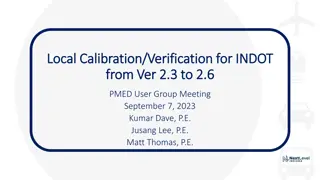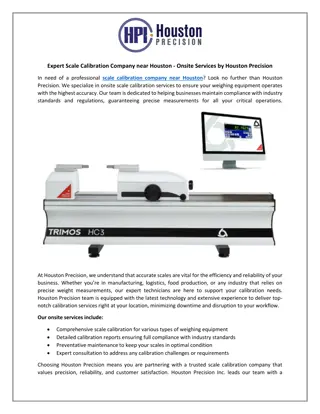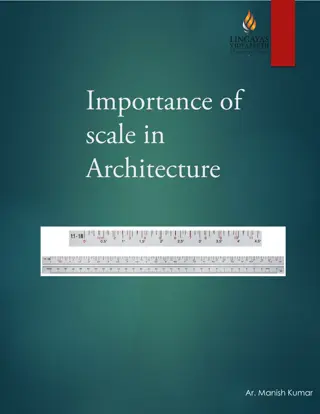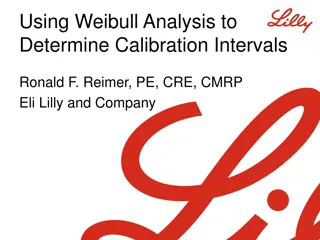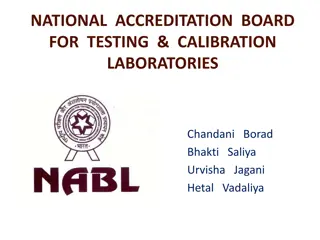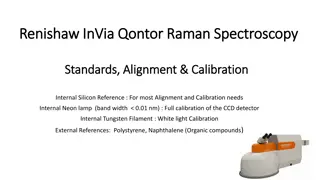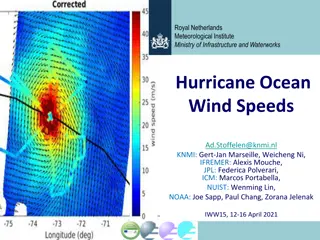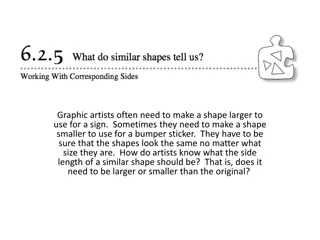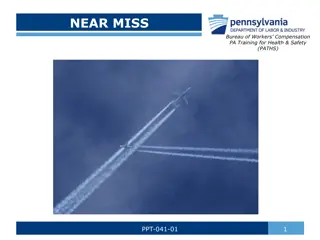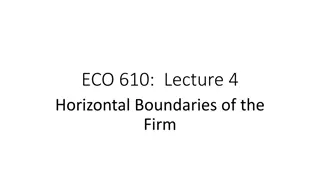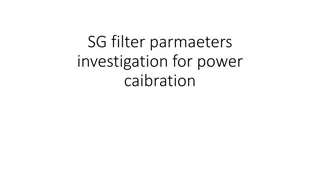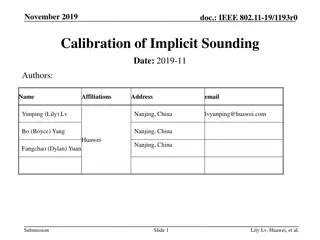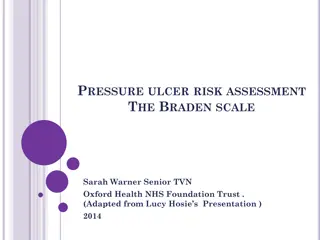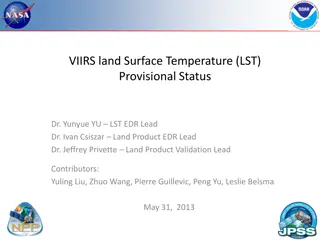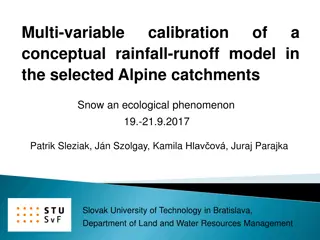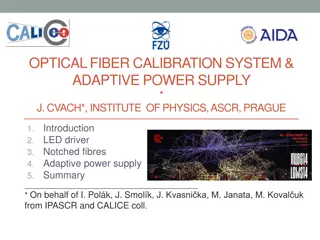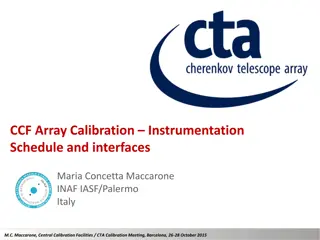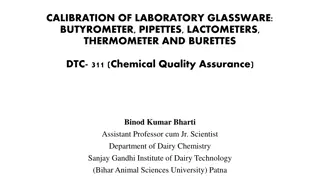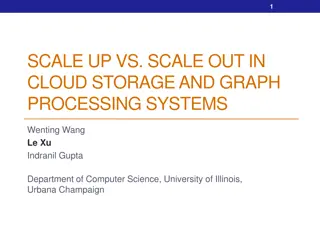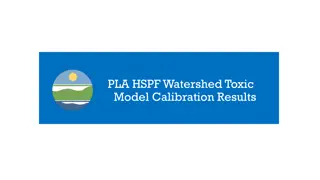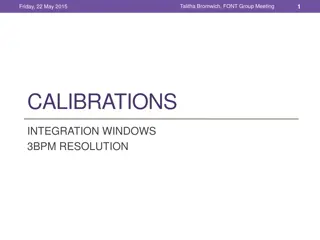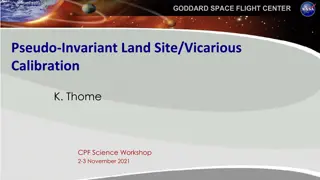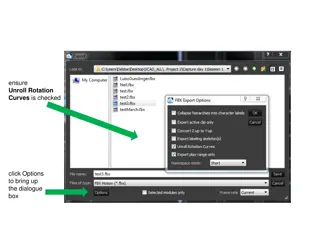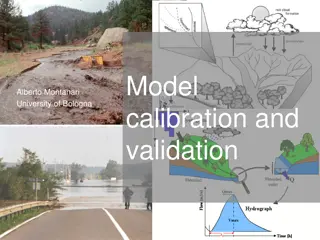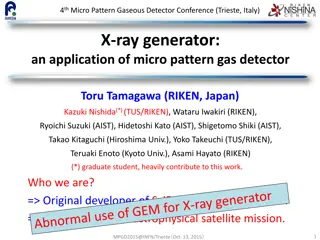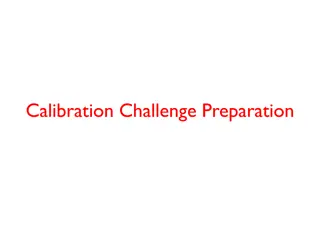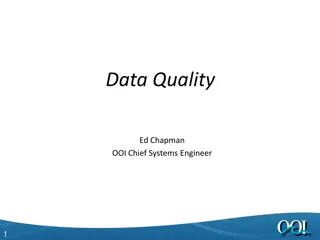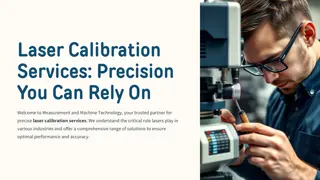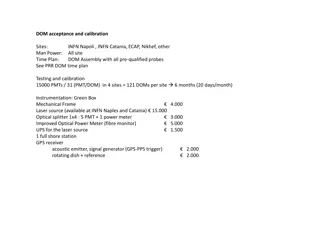How to Study for ASQ Calibration Technician (CCT) Certification Exam
Click Here--- https:\/\/bit.ly\/3HFBYpa ---Get complete detail on ASQ exam guide to crack Calibration Technician. You can collect all information on ASQ tutorial, practice test, books, study material, exam questions, and syllabus. Firm your knowledge on Calibration Technician and get ready to crack
3 views • 13 slides
Precision Perfected: CNC Machine Tool Calibration
Ensure optimal performance and accuracy in your machining processes with our CNC machine tool calibration services. Our expert technicians meticulously calibrate your equipment to industry standards, maximizing efficiency and quality. Trust us to fine-tune your machinery for superior precision and p
4 views • 8 slides
Local Calibration and Verification for INDOT - PMED User Group Meeting
This presentation highlights the local calibration and verification process for the Indiana Department of Transportation (INDOT) from Version 2.3 to 2.6. The session covers the objectives, data collection, processing, and analysis conducted by Kumar Dave, Jusang Lee, and Matt Thomas. INDOT's key fac
1 views • 29 slides
Scale Based Regulation 2023 - Non-Banking Financial Company (NBFCs)
On October 19, 2023, the Reserve Bank of India (\u201cRBI\u201d) has issued \u2018Master Direction \u2013 Reserve Bank of India (Non-Banking Financial Company \u2013 Scale Based Regulation) Directions 2023\u2019 (\u2018SBR Master Direction\u2019). The SBR Master Direction aims to harmonize the Previ
0 views • 9 slides
Understanding Scale Factors and Ratios in Similar Figures
Explore the concept of scale factors and ratios in similar figures through visible learning intentions, warm-up exercises, and practical examples. Learn to determine the scale factor between two similar figures, use scale factors to find missing sides, and apply the knowledge in real-world scenarios
3 views • 13 slides
Expert Scale Calibration Company Near Houston - Onsite Services
In need of a professional scale calibration company near Houston? Look no further than Houston Precision. We specialize in onsite scale calibration services to ensure your weighing equipment operates with the highest accuracy. Our team is dedicated to helping businesses maintain compliance with indu
0 views • 2 slides
Introduction to Spark Streaming for Large-Scale Stream Processing
Spark Streaming, developed at UC Berkeley, extends the capabilities of Apache Spark for large-scale, near-real-time stream processing. With the ability to scale to hundreds of nodes and achieve low latencies, Spark Streaming offers efficient and fault-tolerant stateful stream processing through a si
0 views • 30 slides
Importance and Types of Scale in Architecture
Scale is crucial in architecture for accurate designs and execution. Standard scales are used in architectural drawings to set object sizes, such as human scale and miniature scale. Human scale relates to human dimensions, while miniature scale reduces object sizes. Understanding these scales enhanc
1 views • 6 slides
The New Trade Theory and Economies of Scale in International Trade
The New Trade Theory, emerged in the 1970s, challenges traditional trade theories by emphasizing the role of increasing returns and economies of scale in international trade. It introduces the concept of industrial organization and imperfect competition to explain how countries trade not only based
0 views • 12 slides
Understanding Acids and Bases: pH Scale Explained
Exploring the pH scale, this content delves into the fundamentals of acidity and alkalinity, covering what pH stands for, the inventor of the pH scale, reactions when acids and bases combine, and where the weakest acids and bases are found on the pH scale.
0 views • 7 slides
Optimizing Calibration Intervals Using Weibull Analysis at Eli Lilly
Eli Lilly implements Weibull analysis to determine optimal calibration intervals, highlighting the importance of avoiding excessive preventive maintenance, addressing infant mortality issues, and accurately identifying out-of-tolerance issues to enhance equipment reliability. The company's robust me
0 views • 36 slides
National Accreditation Board for Testing & Calibration Laboratories Overview
The National Accreditation Board for Testing & Calibration Laboratories (NABL) is a key body under the Quality Council of India (QCI). It provides accreditation to testing and calibration labs in alignment with ISO/IEC standards, ensuring high quality and reliability in laboratory services. NABL off
1 views • 37 slides
Renishaw InVia Qontor Raman Spectroscopy Standards and Alignment Procedures
Renishaw InVia Qontor Raman Spectroscopy system features various calibration standards and alignment procedures such as using internal silicon reference, neon lamp calibration, and external references like polystyrene and naphthalene. The system also includes auto-align routines for maintaining opti
0 views • 6 slides
Advanced CGEM Calibration and Alignment Techniques
Explore advanced calibration and alignment techniques in CGEM technology, including Lorentz angle correction, spatial resolution analysis, drift velocity computation, time-related calibration, and alignment methods. Learn about misalignment motivations and strategies to improve track reconstruction
0 views • 15 slides
Challenges in Hurricane Wind Speed Calibration and Validation Metrics
Need for accurate extreme wind measurements is crucial for various applications like hurricane tracking, climate monitoring, and oceanography. This includes reliance on dropsondes for wind speed calibration, validation metrics using multiple methods, and challenges in integrating different sources o
0 views • 22 slides
Understanding Scale Factors and Similar Shapes in Graphic Design
Graphic artists often need to resize shapes for different purposes while ensuring they maintain their original proportions. This involves determining the scale factor between similar shapes, understanding how to find the scale factor using corresponding sides, and dealing with scenarios where sides
0 views • 8 slides
Understanding Near Miss Incidents in Workplace Safety Training
Near misses are unplanned events with the potential for harm that did not result in injury or damage. This training covers the definition of near misses, reporting management, incident types, and reasons for reporting. It emphasizes the importance of addressing system weaknesses to prevent future ac
0 views • 28 slides
Understanding Horizontal Boundaries of Firms in Economics
Exploring the concept of horizontal boundaries in firm behavior, this lecture delves into Long-run Average Cost curve, economies and diseconomies of scale, optimal plant size, and the Minimum Efficient Scale. It discusses how economies of scale affect production costs and the relationship between ma
0 views • 25 slides
Beam Energy Calibration with Compton Scattering Method
The CEPC beam energy calibration with Compton scattering method led by Yongsheng Huang and the CEPC energy calibration working group involves collaborations with various institutions and organizations. The project includes detailed physics requirements, system designs, and implementation plans for b
0 views • 14 slides
WMO Scale of Assessment and Working Capital Fund
The WMO Scale of Assessment for members' contributions and the Working Capital Fund is based on the United Nations Scale, adjusted for differences in membership every 3 years. The latest scale approved by EC-75 for 2023 uses the UN scale from December 2021. The rates for 2026-2027 will be determined
0 views • 9 slides
Optimizing SG Filter Parameters for Power Calibration in Experimental Setup
In this investigation, the aim is to find the optimal SG filter parameters to minimize uncertainty in power calibration while avoiding overfitting. Analyzing power calibration measurements and applying SG filter techniques, the process involves comparing different parameters to enhance filter perfor
0 views • 21 slides
Implicit Sounding Calibration in IEEE 802.11-19/1193r0
Proposal to consider implicit sounding in TGbe to reduce overhead for 16ss and multi-AP cases. The calibration accuracy is crucial to maintain channel reciprocity. Lab test results demonstrate the feasibility of implicit sounding. The document discusses absolute and relative calibration methods in 8
0 views • 11 slides
Understanding Pressure Ulcer Risk Assessment with the Braden Scale
Pressure ulcer risk assessment is crucial in healthcare settings to identify individuals at risk of developing pressure ulcers. The Braden Scale, developed in 1984, evaluates six key elements contributing to pressure ulcer development. It provides a standardized method for assessing risk levels base
0 views • 20 slides
VIIRS Land Surface Temperature (LST) Calibration Approach and Data Analysis
The VIIRS Land Surface Temperature (LST) Provisional Status project, led by Dr. Yunyue Yu, focuses on improving the LST EDR through algorithm coefficient updates and calibrations. The calibration process involves regression steps and comparisons with reference datasets like MODIS Aqua LST. Various c
0 views • 29 slides
Calibration of Multi-Variable Rainfall-Runoff Model Using Snow Data in Alpine Catchments
Explore the calibration of a conceptual rainfall-runoff model in Alpine catchments, focusing on the importance of incorporating snow data. The study assesses the benefits of using multi-objective approaches and additional datasets for model performance. Various aspects such as snow cover, groundwate
0 views • 16 slides
Optical Fiber Calibration System & Adaptive Power Supply by J. Cvach
Introduction to an optical fiber calibration system and adaptive power supply developed by J. Cvach from the Institute of Physics, ASCR, Prague. The system includes an LED driver, notched fibers, and adaptive power supply for various applications, such as the calibration of the CALICE AHCAL and LHCb
0 views • 13 slides
Array Calibration Instrumentation Interfaces and Schedule by Maria Concetta Maccarone at CTA Calibration Meeting
Maria Concetta Maccarone from INAF IASF/Palermo presented on the instrumentation interfaces and schedule for array calibration within the CCF project at the CTA Calibration Meeting in Barcelona. The presentation discussed major interfaces within the CTA instrument, methods for calibration, and the i
0 views • 6 slides
Calibration of Laboratory Glassware for Milk Analysis
Laboratory glassware such as butyrometer, pipettes, lactometers, thermometers, and burettes play a crucial role in analyzing milk composition and quality. Proper calibration of these glassware items is essential to ensure accurate results, compliance with standards, and quality control in dairy labo
0 views • 22 slides
Comparing Scale-Up vs. Scale-Out in Cloud Storage and Graph Processing Systems
In this study, the authors analyze the dilemma of scale-up versus scale-out for cloud application users. They investigate whether scale-out is always superior to scale-up, particularly focusing on systems like Hadoop. The research provides insights on pricing models, deployment guidance, and perform
0 views • 27 slides
PLA HSPF Watershed Toxic Model Calibration Results Summary
This summary provides insights into the calibration results of the PLA HSPF Watershed Toxic Model. It includes information on the Green/Duwamish River sub-watersheds, estimated loads to LDW toxic load reach 604, and the statistical calibration targets for HSPF toxic simulations. The calibration sequ
0 views • 10 slides
FONT Group Meeting - May 22, 2015 Calibration Integration Updates
Talitha Bromwich leads the FONT Group Meeting on May 22, 2015, discussing calibration integration updates, data analysis techniques, and integration window adjustments for 3BPM resolution studies. The meeting covers topics such as cuts and fitting, changing integration windows, measurement of jitter
0 views • 12 slides
Radiometric Calibration Methods for Remote Sensing Applications
Techniques for radiometric calibration in remote sensing include vicarious approaches utilizing invariant desert sites, in-situ methods characterizing surfaces and atmospheres, and SI-traceable measurements for intercomparisons between sensors. The repeatability of in-situ results and comparison wit
0 views • 20 slides
Camera Calibration and Post-Processing Guide
Enhance your camera calibration and post-processing skills with this comprehensive guide. Ensure proper settings and follow step-by-step instructions for accurate results. From unrolling rotation curves to solving motion, this guide covers it all. Utilize tools like auto masking, wand wave data coll
0 views • 15 slides
Understanding the Importance of Calibration in Hydrological Modeling
Hydrological models require calibration to adjust parameters for better representation of real-world processes, as they are conceptual and parameters are not physically measurable. Calibration involves manual trial and error or automatic optimization algorithms to improve model accuracy. Objective f
0 views • 12 slides
Advancements in Triggerable X-ray Generators for Calibration in Space
The development of triggerable X-ray generators for onboard calibration devices in space is discussed, focusing on the application of micro-pattern gas detectors. The challenges and solutions for realizing triggerable X-ray generation, including the selection of electron sources and conceptual desig
0 views • 18 slides
CLAS12 Calibration Challenge: Preparation, Goals, Metrics, and Team Analysis
The CLAS12 Calibration Challenge involves preparing and testing calibration suites, running calibration code on simulated data, and comparing calibration constant values to extracted ones for successful calibration. Goals include testing individual calibration suites, the CLAS12 calibration procedur
0 views • 8 slides
Data Quality Protocols and Procedures for Instrument Calibration and Sampling Rate Management
This document outlines the data quality protocols and procedures recommended for instrument calibration, automated quality control thresholds, and flagging, as well as sampling rate strategy development and management for oceanographic instruments both shoreside and at-sea. It covers pre-deployment
0 views • 23 slides
Laser Calibration Services: Precision You Can Rely On
Ensure accuracy and performance with our professional laser calibration services. Specializing in aligning machinery and equipment, we help optimize precision for industrial applications. Our advanced calibration techniques minimize downtime and impr
1 views • 8 slides
Near-UV Satellite Observations for Retrieving Aerosol Properties
Near-UV satellite observations offer a valuable method for retrieving aerosol properties, including aerosol optical depth, absorption, layer height, and surface albedo. These observations provide advantages like sensitivity to aerosol properties and negligible gas absorption interference. However, c
0 views • 16 slides
DOM Acceptance and Calibration Plan Overview
This comprehensive plan outlines the acceptance and calibration processes for Deployed Optical Modules (DOMs) across multiple sites. It includes detailed instructions for assembly, testing, and calibration procedures involving sophisticated instrumentation and time-sensitive tasks. The plan covers i
0 views • 6 slides


